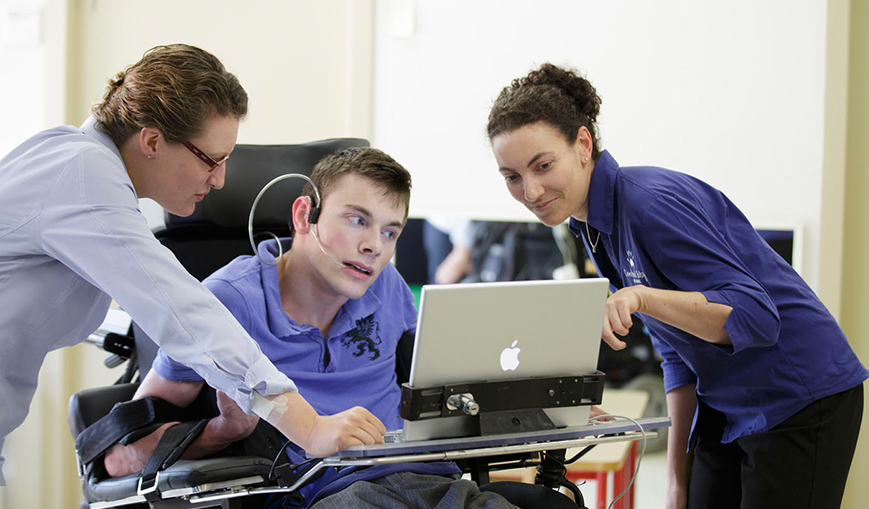Supporting an individual who has a special need, identification or recent diagnosis involves assisting them in adjusting to their current life challenges, personality, cognitive abilities, and behaviours. The individual may require support in communication, emotional liability, impulsivity, preservations and/or physical daily activities. The use of visual aids and strategies can support an individual improving functional independence and overall quality of life.
WHO ARE CAREGIVERS?

The term “caregiver” describes a family member or a paid helper who regularly looks after a child, a sick individual, elderly or disabled person. The short answer is most of us, at some point in our lives.
Caregivers are daughters, sons, wives, husbands, grandchildren, nieces, nephews, partners, neighbours and friends. While some people receive care from paid caregivers, most rely on unpaid assistance from families, friends, and neighbours.
Most people will, at some point in their life, help a family member or friend with a long-term health condition, disability or problems related to aging. Providing care has many benefits. In addition to reducing the costs associated with health services and institutionalization, it also benefits the care receiver, allowing them to remain at home and maintain a better quality of life.
WHAT IS CAREGIVING?

Caregiving takes many forms. Many of us help older, ill, or disabled family members and friends every day. We know we are helping, but we don’t think of ourselves as caregivers. We are glad to do this and feel rewarded for it. However, if the demands are heavy, over time we can also become exhausted and stressed.
WHAT DO CAREGIVERS DO?
Caregivers give assistance to people who are sick, injured, mentally or physically disabled, or elderly and fragile. They work in the home assisting the individual with daily activities, such as bathing and bathroom functions, feeding, grooming, taking medication, and some housework. They also assist in arranging and attending appointments with doctors, providing or arranging transportation and social activities while being a companion.
CONSIDER THESE FACTS:
✓ In 2018, approximately one in four Canadians aged 15 and older (or 7.8 million people) provided care to a family member or friend with a long-term health condition, a physical or mental disability, or problems related to aging
✓ 1 in 4 caregivers helps with medical treatments and provides personal care, including help with bathing and dressing. Women represent 54% and caregiving responsibilities most often fell to those aged 45 to 64, with 44% of caregivers in this age category.
✓ Caregivers of spouses devoted the most time, typically 14 hours a week on some form of care, while caregivers of children (including adult children) spent 10 hours per week. Caregivers of parents are the largest segment of caregivers; typically spending 4 hours, while caregivers of grandparents and friends spend 2 hours. Overall, caregivers typically spend 3 hours a week caring for an ill or disabled family member or friend. The amount of time can vary depending on the relationship between caregiver and care receiver.
✓ In Ontario, 1 in 5 is a family caregiver, contributing to more than 70% of total caregiving needs. The caregiving responsibilities are often intense and lengthy in duration.
✓ Age-related needs were identified as the single most common problem requiring help from caregivers (28%). This was followed by cancer (11%), cardiovascular disease (9%), mental illness (7%), and Alzheimer’s disease and dementia (6%).
✓ Contrasting the overall picture, cancer was the leading reason behind spousal caregiving (17%), while problems with mental health, such as depression, bipolar disorder and schizophrenia, were the most common reasons for parents caring for a sick child (23%).
✓ Caregivers perform a range of tasks in caring for their family member or friend, with providing transportation being the most commonly reported (73%). Other tasks included housework (51%), house maintenance and outdoor work (45%), scheduling and coordinating appointments (31%), managing finances (27%), helping with medical treatments (23%) and providing personal care (22%).
http://www.statcan.gc.ca/daily-quotidien/130910/dq130910a-eng.htm
Join The Conversation
Are you supporting a challenging client or loved one? What is the most difficult thing you deal with as a caregiver? Leave me a comment here, and join the conversation on Facebook where I asked, “The most difficult thing about being a caregiver is_____________.”
Workshop Presentation - Visual Aids and Strategies for Caregivers/Parents
Contact Vizually Speaking today to learn how Visual Aids and Strategies for Caregivers/Parents can decrease the undesired behaviour(s), improve communication, promote independence and increase self-confidence. Through our dynamic presentation you will:
✓ Uncover the importance of using Visual Aids and Strategies.
✓ Discover the benefits of Visual Aids and Strategies.
✓ Learn how to overcome communication barriers.
✓ Promote independence and decrease undesired behaviours.
✓ Be introduced to NEW resources.
EVERYONE benefits from Visual Aids!

Caring for a loved one who has special needs, an identification or recent diagnosis can be difficult. It requires understanding, patience, and compassion. Vizually Speaking understands. We are here to help you. We design, create and implement individualized visual aids and strategies improving the quality of life of the individual in your care. Contact us today for your FREE consultation.
RELATED POSTS YOU MAY LIKE
RELATED LINKS:
211
Ontario has a central community information line that can provide you with a wealth of information about resources in your community.
https://211ontario.ca/ or dial 211.
thehealthline.ca
Find community services in your area of Ontario using the name of your community, postal code, or by map.
http://www.thehealthline.ca/
Community Care Access Centers
Ontario’s 14 Community Care Access Centres (CCACs), located across the province, assist people in getting the home and community care they need in their region.
http://healthcareathome.ca/
Ontario Community Support Association
OCSA is the voice of home and community support, representing hundreds of agencies, 25,000 staff, and 100,000 volunteers across Ontario.
http://www.ocsa.on.ca/
Home Care Ontario
Home Care Ontario is a member-based organization representing providers of quality home care services from across Ontario
http://www.homecareontario.ca/
Ontario Ministry of Labour – Family Caregiver Leave
Family caregiver leave is unpaid, job-protected leave of up to eight weeks per calendar year per specified family member.
https://www.ontario.ca/document/your-guide-employment-standards-act-0/family-caregiver-leave
Federal Resources:
Service Canada – Being A Caregiver
Service Canada provides some links to supports and other resources provided by the Federal Government.
http://www.servicecanada.gc.ca/eng/lifeevents/caregiver.shtml
Canada Revenue Agency (CRA) – Family Caregiver Tax Credit
For 2014 and subsequent years, if you have a dependent with an impairment in physical or mental functions, you may be eligible for the Family Caregiver Tax Credit. Visit the CRA website for more information.
https://www.canada.ca/en/revenue-agency/services/tax/individuals/topics/about-your-tax-return/tax-return/completing-a-tax-return/deductions-credits-expenses/family-caregiver-amount.html
Provincial Resources:
The Caregiver Exchange
If you’re caring for a family member or friend who is facing the challenges of age, disability, illness, or injury, CaregiverExchange.ca can connect you with a wide range of information, services, and supports.
http://www.caregiverexchange.ca/
Caregiving Matters
Caregiving Matters is an internet-based registered charity offering education and support to family caregivers.
Canadian Virtual Hospice
The Canadian Virtual Hospice provides support and personalized information about palliative and end-of-life care to patients, family members, health care providers, researchers, and educators.
http://www.virtualhospice.ca/en_US/Main+Site+Navigation/Home.aspx
The Powerhouse Project
The Powerhouse Project offers online resources and articles for Ontario’s young carers – youth and young adults, who are in a caregiving role for a family member needing assistance with their daily-lived experience.
http://www.powerhouseproject.ca/
Caregiver Advocacy:
Ontario Caregiver Coalition
The Ontario Caregiver Coalition is dedicated to recognizing the importance of unpaid caregivers in Ontario by raising awareness of the value they add to the health care system, and by advocating for improved, fair access to needed supports. OCC strives to be the ‘voice’ of caregivers in the province.
http://www.ontariocaregivercoalition.ca/
Carers Canada
Established in 2000, Carers Canada is a virtual alliance of diverse partner organizations that work collectively, and autonomously, to identify and respond to the needs of caregivers in Canada.




